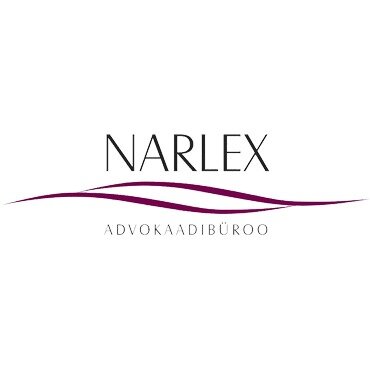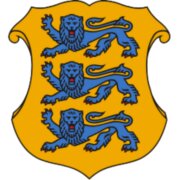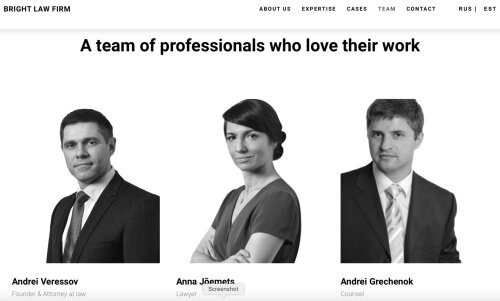Best Communications & Media Law Lawyers in Estonia
Share your needs with us, get contacted by law firms.
Free. Takes 2 min.
Or refine your search by selecting a city:
List of the best lawyers in Estonia
About Communications & Media Law in Estonia
Communications & Media Law in Estonia encompasses all legal regulations related to broadcasting, telecommunications, print media, online content, and digital communications. This field of law addresses issues such as intellectual property rights, freedom of speech, privacy laws, and regulations ensuring fair competition. The Estonian legal system aims to foster a free and open media environment while maintaining necessary protections against misuse and infringement. With Estonia being highly digitalized, the legal landscape also includes robust laws governing internet governance and data protection.
Why You May Need a Lawyer
People in Estonia may seek legal advice in Communications & Media Law in various scenarios, including:
- Launching a new media or telecommunications business and navigating licensing requirements.
- Handling disputes over intellectual property rights, such as copyright or trademark issues.
- Addressing defamation claims due to published or broadcast content.
- Ensuring content complies with Estonian media regulations and advertising standards.
- Responding to legal challenges related to data protection and privacy violations.
- Understanding complex digital communications regulations affecting technology startups.
- Managing compliance with national and EU-wide telecommunications laws.
Local Laws Overview
Estonia’s Communications & Media Law is heavily influenced by both national directives and European Union regulations. Key aspects include:
- The Broadcasting Act, which governs TV and radio services and requires broadcasting licenses.
- The Electronic Communications Act, stipulating rules for telecommunications service providers.
- The Information Society Services Act, applying to online media and requiring transparency regarding consumer rights.
- Data protection laws such as the GDPR, which strongly influence the management of personal information.
- The Consumer Protection Act, which includes regulations on advertising and marketing practices.
Frequently Asked Questions
What is the role of the Estonian Technical Regulatory Authority?
The Estonian Technical Regulatory Authority oversees compliance and issues licenses for broadcasting and telecommunications activities, ensuring adherence to national regulations.
Do I need a license to start an online media platform?
While traditional broadcasting requires a license, online media platforms generally do not. However, compliance with the Information Society Services Act is necessary.
How does Estonia protect freedom of expression?
Estonian Constitution guarantees freedom of expression, but this is balanced with laws against hate speech, defamation, and protection of privacy.
What are the penalties for data protection violations?
Data protection violations can result in significant fines, which are calculated based on the GDPR guidelines, potentially reaching up to 4% of annual global turnover.
What are the limitations on advertising in Estonia?
Advertising is regulated under the Consumer Protection Act, with restrictions on misleading advertisements and requirements for truthfulness and clarity.
How are defamation cases handled in Estonia?
Defamation is addressed both in civil and criminal law, providing individuals channels to seek redress and claim damages for reputational harm.
Are there any specific regulations for mobile communications?
Mobile and telecommunications services are regulated under the Electronic Communications Act, which sets out rules for operating and managing telecommunications infrastructure and frequencies.
Is Estonia part of any international media agreements?
Estonia adheres to various international agreements as a member of the EU and other global bodies, influencing its media laws, including agreements on cross-border broadcasting.
Can foreign entities own media companies in Estonia?
Yes, foreign ownership of media companies is allowed in Estonia, although they must comply with local laws and regulations.
How does Estonia regulate internet content?
Internet content regulations are primarily aimed at ensuring data protection, combating illegal content, and complying with both national and EU legislation on digital services.
Additional Resources
For further information on Communications & Media Law in Estonia, consider reaching out to or exploring the following resources:
- Estonian Ministry of Economic Affairs and Communications - Provides guidelines and updates on telecommunications policies.
- Estonian Data Protection Inspectorate - Offers information and guidance on data protection laws and practices.
- Estonian Bar Association - Represents professional lawyers who can provide expert advice and representation.
- European Union Publications Office - Provides access to EU legislation and policy documents affecting Estonia.
Next Steps
If you require legal assistance in Communications & Media Law in Estonia, consider the following steps:
- Identify the specific area of law or issue you need guidance on.
- Contact a qualified lawyer or a law firm specializing in Communications & Media Law.
- Prepare all relevant documents and information related to your situation.
- Consider seeking initial consultations to discuss your case and understand potential legal actions.
- Stay informed about developments in local and EU Communications & Media legislation that could impact your case.
Lawzana helps you find the best lawyers and law firms in Estonia through a curated and pre-screened list of qualified legal professionals. Our platform offers rankings and detailed profiles of attorneys and law firms, allowing you to compare based on practice areas, including Communications & Media Law, experience, and client feedback.
Each profile includes a description of the firm's areas of practice, client reviews, team members and partners, year of establishment, spoken languages, office locations, contact information, social media presence, and any published articles or resources. Most firms on our platform speak English and are experienced in both local and international legal matters.
Get a quote from top-rated law firms in Estonia — quickly, securely, and without unnecessary hassle.
Disclaimer:
The information provided on this page is for general informational purposes only and does not constitute legal advice. While we strive to ensure the accuracy and relevance of the content, legal information may change over time, and interpretations of the law can vary. You should always consult with a qualified legal professional for advice specific to your situation.
We disclaim all liability for actions taken or not taken based on the content of this page. If you believe any information is incorrect or outdated, please contact us, and we will review and update it where appropriate.
Browse communications & media law law firms by city in Estonia
Refine your search by selecting a city.













